How To Hit A Driver: Expert Advice From 3 PGA Professionals
Knowing how to hit a driver is fundamental to becoming a better golfer and lowering your handicap. These expert tips will transform your performance off the tee

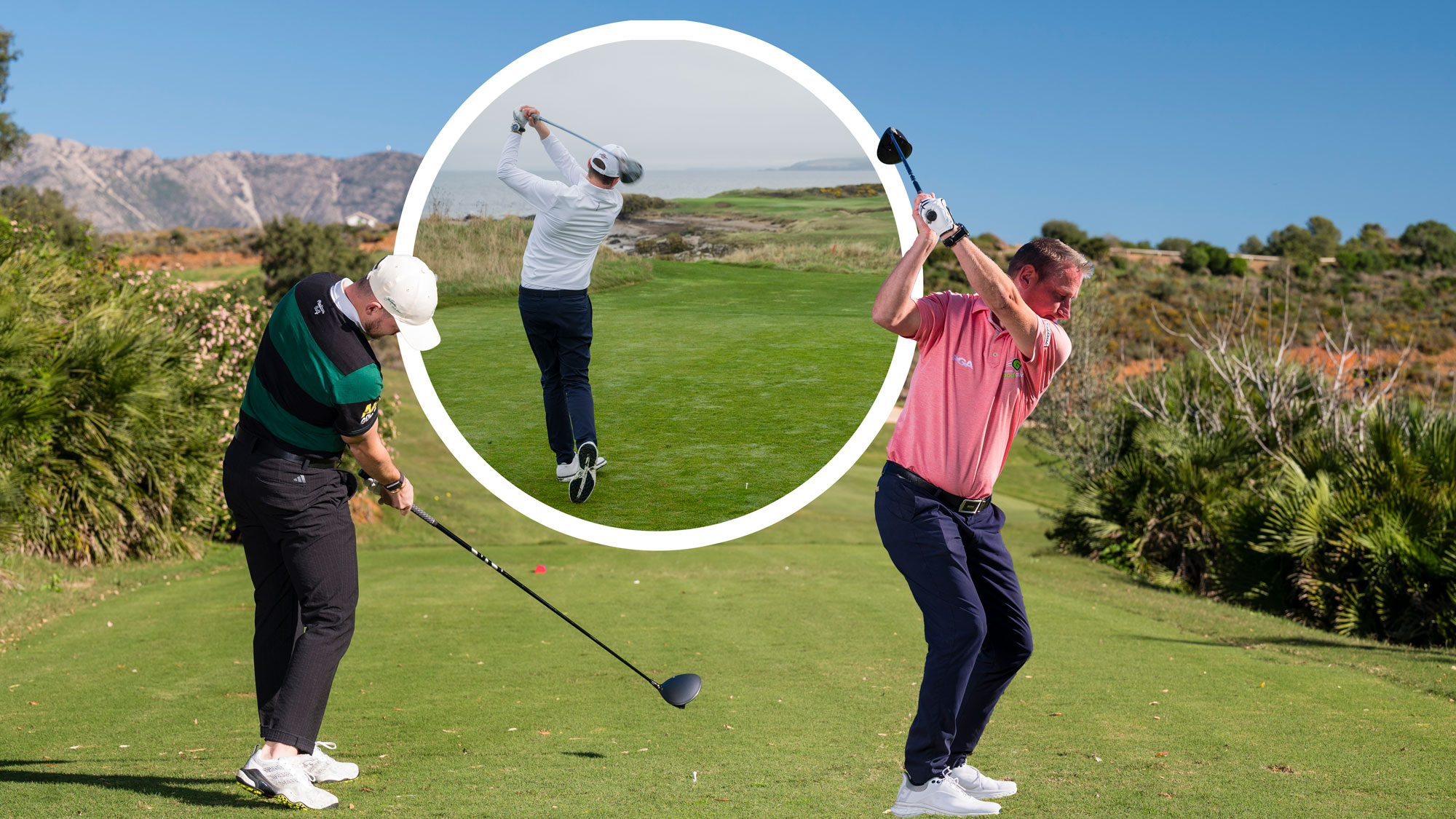
Learning how to hit a driver is a fundamental skill that all amateur golfers must learn in order to give themselves the best chance of lowering their handicap and playing better golf.
With so many different aspects to consider, like how to master the different stages of the swing, how to generate more power or whether you need the best driver on the market, you could be forgiven for having plenty of questions.
Driving is a popular area of the game that players of all abilities focus on in their practice sessions, so whether you are a novice looking for beginner golf tips or a low-handicapper striving to play off scratch - we have something just for you in this article.
Well, in the interest of providing you with the most comprehensive guide out there, we asked three of our Golf Monthly Top 50 Coaches to share their best driving tips to help you hit your best ever tee shots...
The Quick Tips: Step-By-Step Guide
- Ball position slightly forward of sternum
- Feet at least shoulder width apart and weight evenly distributed
- Do not lean back at address as this will change your low point
- Low, wide takeaway
- Maintain width throughout backswing
- Coil up to the top with lead shoulder sitting over inside of trail knee
- Transfer weight from trail heel to ball of lead foot as first move in downswing
- Bring trail elbow tight into side on the way down
- Shaft parallel with lead arm at impact
- Wide release the clubhead and allow forearms to cross over past impact
Anders Mankert: How To Hit A Driver
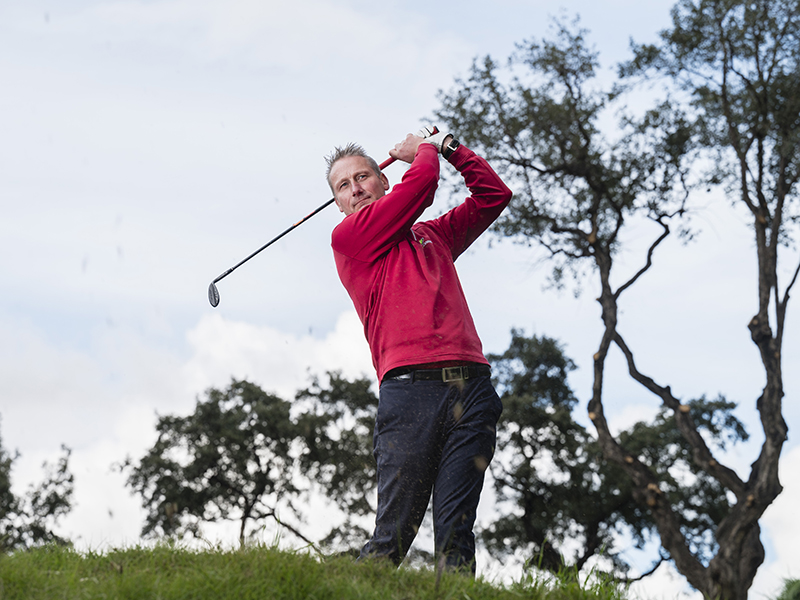
Anders Mankert is the owner and head professional at Leicester Golf Centre, with a coaching career spanning more than 28 years.
In 2024, Anders received the title of Master PGA Professional - becoming only the 65th person in history to be awarded that accolade. His vast coaching experience has transformed the golf swing of many amateurs and professionals, while also striving to grow the game through his revolutionary work at Leicester Golf Centre.
Setup
The driver setup position is the first stage of the swing, and is crucially important to the success of the shot. This is a great place to start for anyone looking for beginner driver tips, but is also equally important for more seasoned golfers to focus on in their practice routines.
Start with the ball position slightly in front of your sternum, underneath your left armpit (for a right-handed golfer). This will allow you to hit the ball slightly on the up, as your low point is directly below your sternum.
Subscribe to the Golf Monthly newsletter to stay up to date with all the latest tour news, equipment news, reviews, head-to-heads and buyer’s guides from our team of experienced experts.
Use a shoulder width (or wider) stance, and spread your weight evenly across your lead and trail foot. Try not to lean back away from the ball (away from target) as this will move your sternum and therefore your low point, causing the club to bottom out before the ball.
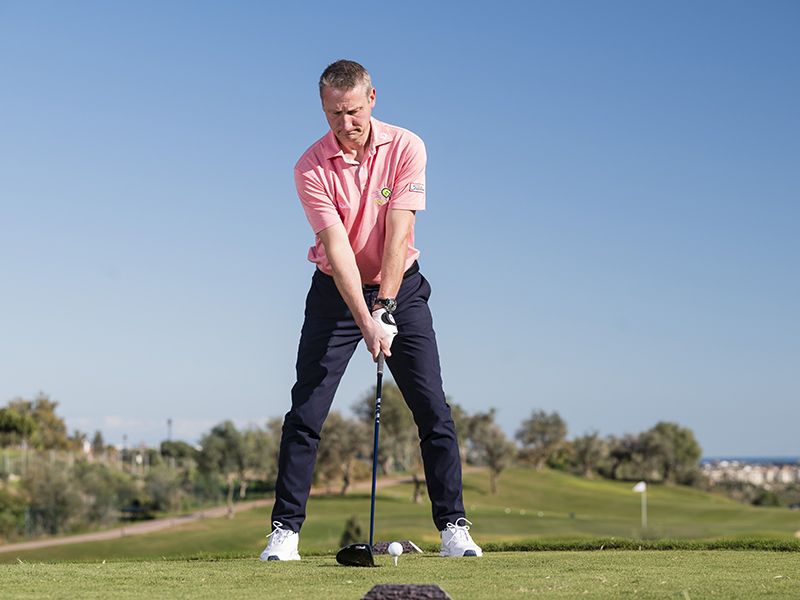
Mastering the correct setup position with driver will make a huge difference to your power and accuracy
Backswing
Aim for plenty of width in the driver backswing and try to maintain it all the way up to the top. The takeaway keeps the clubhead low to the ground in the early phase, and moves up as we start to rotate our lower body and shoulders.
A great reference point is your lead shoulder moving over the inside of your trail foot in the backswing, creating a tightly wound powerful movement. This will likely feel a little uncomfortable, but it's crucial you coil up as much as possible to get maximum power output.
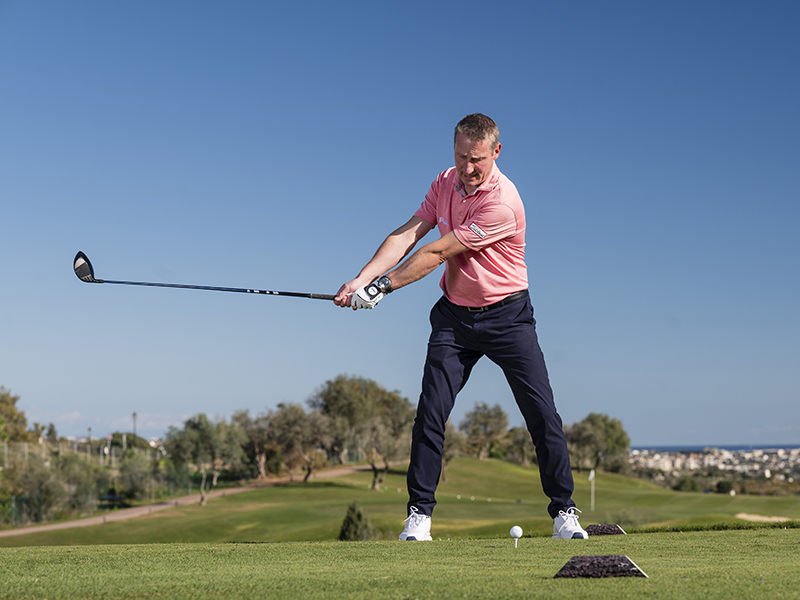
Maintaining the width throughout the backswing is key
Downswing
The first movement to start the downswing is a transfer of weight from the heel of your trail foot into the ball of your lead foot. The trail elbow then falls closely into the ribs of your trail side, with the clubhead around a third closer to you than when it travelled up in the backswing. This will allow you to attack the ball on the correct path and avoid an over the top swing.
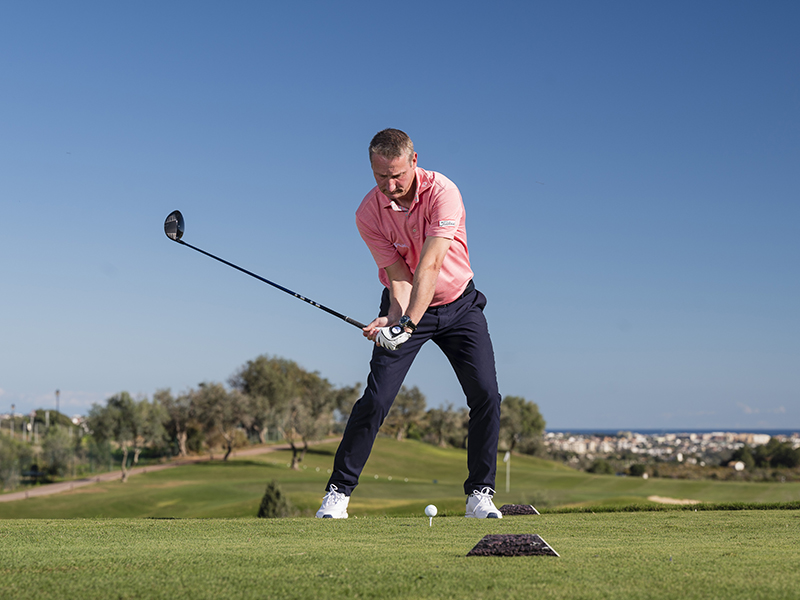
The swing narrows on the way down with the trail elbow tucking in before impact
Impact Position
This is the point where we explode into releasing the club. The hands and forearms really whip over and deliver a lot of clubhead speed. At impact the shaft should be parallel with lead arm, as opposed to the shaft lean you would see with an iron or a wedge. This is illustrated clearly in the image below.
After impact, the swing becomes much wider again as the clubhead is released through the ball. The pattern to follow is: wide, narrow, wide.
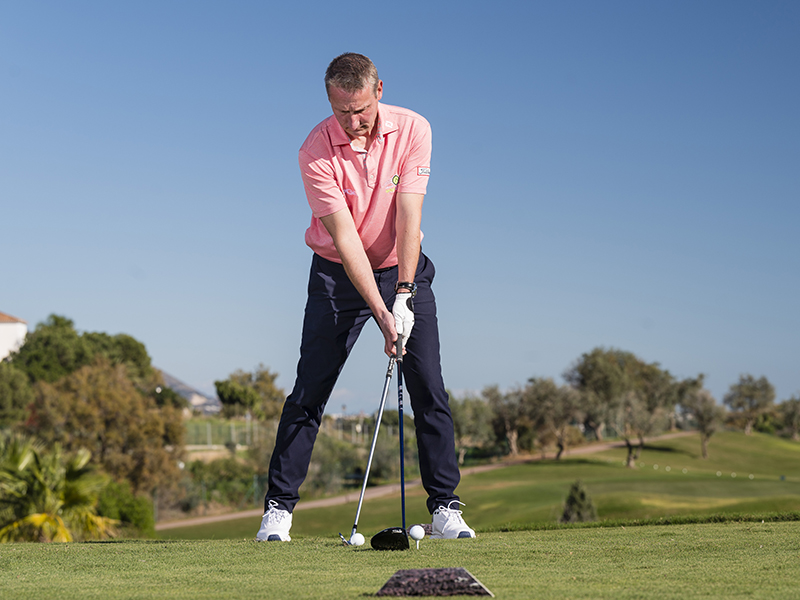
The difference between the impact position with an iron or wedge in relation to driver
Alex Elliott: Generate More Power With Driver

Alex spent three years caddying on the European Tour before taking his PGA qualifications. Since then he has created a thriving social media platform on Instagram and YouTube, where he offers a whole host of tips and advice to help viewers shoot lower scores.
Grip
One of the first things you should be considering when searching for more power with driver is creating the perfect grip. Many amateurs start with the grip in the palm of their hand, which significantly limits the speed they are able to achieve. To remedy this, we need to ensure you start feel the grip more in your fingers.
In your normal setup position, allow the grip of the club to drop down as low as it can go without you dropping it. In the image below, you can see how the toe of the club has come off the ground, which makes it a lot easier to avoid that palm contact. I want you to hold the grip of the club like you are picking up a basket of shopping in a supermarket. Do this, and you won’t be far off that optimal position for a big, powerful drive.
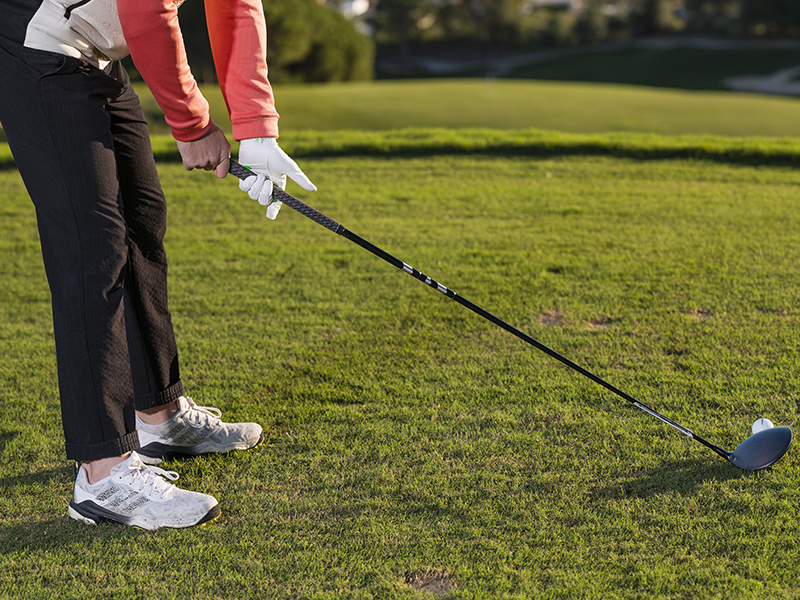
This drill is a great way to get the correct feel for the perfect driver grip
Tee Height
Tee height plays a huge part in the distance you can achieve with driver, but many amateurs struggle due to pegging it up too high or too low. To give yourself the best chance of sending it long and straight down the fairway, ensure that only one quarter of the golf ball sits below the line at the top of the clubface. This will promote a little more shoulder tilt and will encourage you to hit up on the ball.
The X-Factor Stretch
In simple terms, the X-factor is the relationship between the line of your shoulders and the line of your hips in the golf swing.
The greater the stretch between these lines, the more potential power we can create with our driver. In order to create the stretch, the lower body must rotate back towards the target while the upper body is still completing the backswing.
A great drill for this is to start with both feet together, then as the hands reach shoulder height in the backswing the lead foot steps forward to the target side. Start slowly and build up your speed once you have the tempo correct. This drill will encourage the hips to start moving down and the hands are still moving up, accentuating the X-factor stretch.
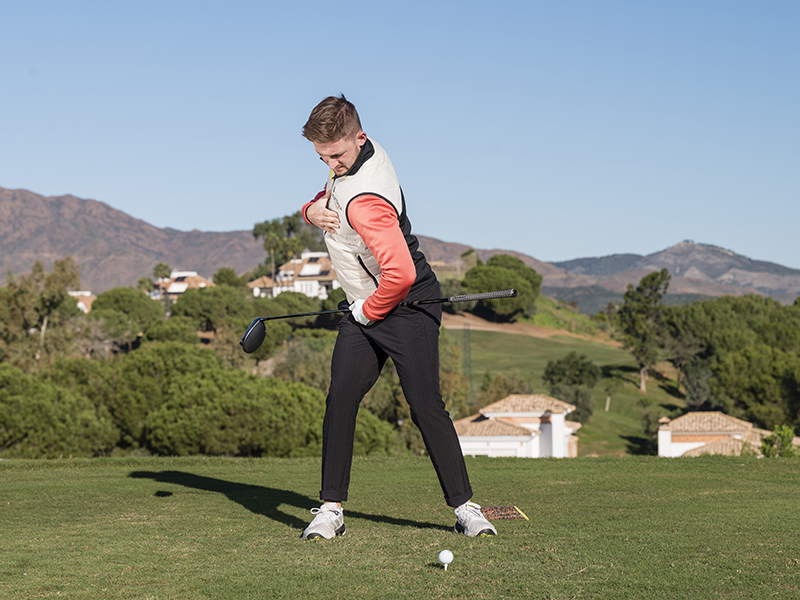
The X-factor stretch occurs when the hips start to rotate towards the target at the start of the downswing, while the hands and upper body are still completing the backswing
Ben Emerson: How To Hit A Driver In Challenging Conditions

Ben Emerson is a Golf Monthly Top 50 Coach with a modern approach to the game. His methods have seen him become one of the most revered coaches in the country, and even has a few celebrity clients on his books. In his coaching career of more than 20 years, Ben has helped golfers of all ages and abilities to improve their performances and enjoy the game.
As much as we would like to play in perfect conditions all the time, that sadly isn't the reality. Golf is a game where you have to negotiate the elements, and change your strategy to manage your game when things get challenging.
Let's use playing in the wind as an example, as you are likely to have to do this at some point in your normal golf season. My best piece of advice would be to not fight the wind, especially if you are a mid- to high-handicapper. Playing a fade or a draw against the wind is a dangerous strategy, as if conditions die down midway through your ball flight you could find yourself in some tricky positions.
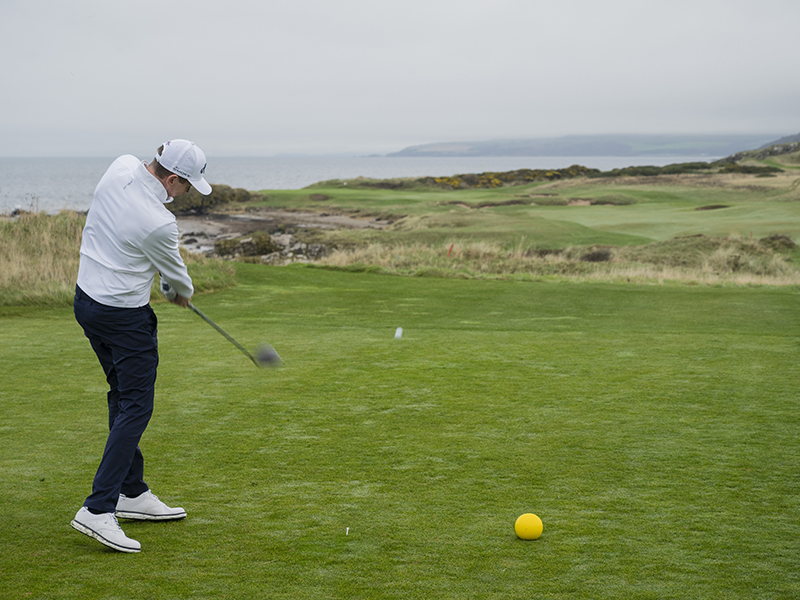
The majority of the adaptions to your approach actually come at setup, where I would advise you to move the ball slightly back in your stance and place your hands ever so slightly forwards of your normal position.
You would also benefit from swinging it a little more 'easy', as the harder you hit it the more spin you will be putting on the ball. That's not always a good combination with windy conditions, so focus on a nice smooth swing and centred strike.
Playing in colder or wetter conditions? Why not try these simple winter hacks from Golf Monthly Top 50 Coach Adam Harnett...
A post shared by Golf Monthly (@golfmonthly)
A photo posted by on
FAQs
Q: Do You Swing A Driver The Same As You Swing An Iron?
A: There are many differences between a driver swing and an iron swing. Some examples would be that with driver the ball position is further forward and the swing plane is more rounded. With an iron, there is more shaft lean at impact and there is more of a downward angle of attack.
Q: How Do I Know Which Driver To Buy As A Beginner?
A: As a beginner golfer, it can be hard to know which equipment is right for you. With lots of jargon and plenty of options, it can be overwhelming trying to decide, so why not check out our brilliant guide on the best drivers for beginners? Our expert buying advice can help you to make an informed decision, allowing you enjoy your golf from day one.

Baz joined Golf Monthly in January 2024, and now leads the instruction section across all platforms - including print and digital. Working closely with Golf Monthly's Top 50 Coaches, he aims to curate and share useful tips on every aspect of the game - helping amateurs of all abilities to play better golf. Baz also contributes weekly to the features section, sharing his thoughts on the game we love and the topics that matter most. A member at Sand Moor Golf Club in Leeds, he looks forward to getting out on the course at least once a week in the pursuit of a respectable handicap.
Baz is currently playing:
Driver: Benross Delta XT
3-Wood: Benross Delta XT
Hybrid: TaylorMade Stealth 4 Hybrid
Irons: Benross Delta XT 5-PW
Wedges: TaylorMade RAC 60, Callaway Jaws MD5 54
Putter: TaylorMade Spider Tour
- Ben EmersonTop 50 Coach
- Anders MankertMaster PGA Professional and Golf Monthly Top 50 Coach
- Alex ElliottTop 50 Coach